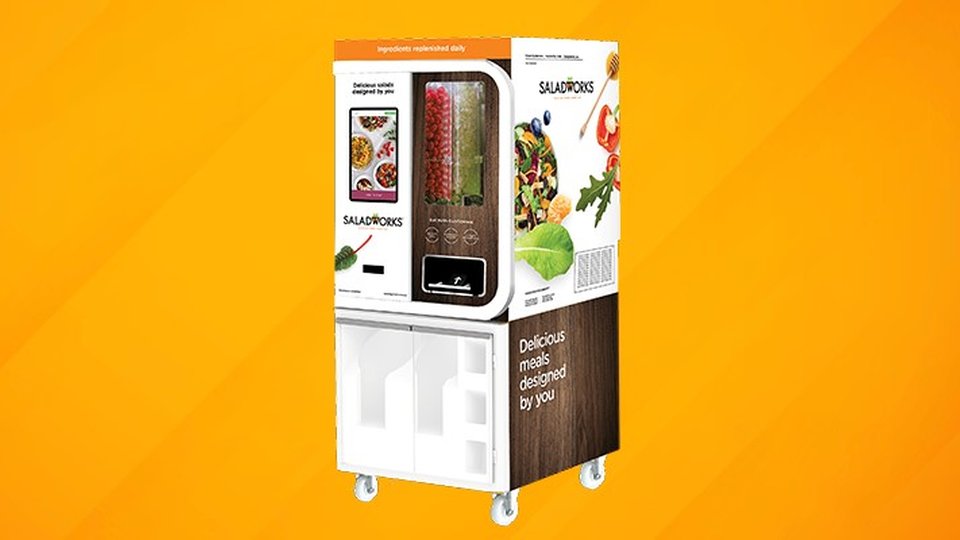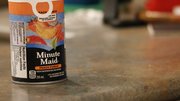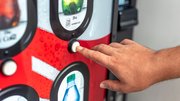Vending
Fast casual chain pins growth on robotic salad vending machine
When restaurants were closing in response to COVID-19, Saladworks went into overdrive targeting non-traditional locations. The Chowbotics robotic saladmaker has been a key technology.

September 16, 2020 by Elliot Maras — Editor, Kiosk Marketplace & Vending Times
(Editor's note: An earlier version of this article ran on Kiosk Marketplace, a Vending Times sister publication.)
When COVID-19 took the foodservice industry by surprise this past spring, Saladworks was nearly two years into its plan to penetrate non-traditional locations, such as hospitals, schools and supermarkets.
For Saladworks — a brand synonymous with healthy food — the coronavirus pandemic catapulted plans already in place to extend its build-your-own salad concept beyond brick-and-mortar stores.
 |
| Eric Lavinder of Saladworks is optimistic about non-traditional locations. Photo courtesy of Saladworks. |
"We've had to be innovative," Eric Lavinder, vice president of franchise development, told this website, reflecting on the past six months. "As much as technology has changed, COVID is changing everything."
Diversification into non-traditional locations
While many of the fast casual's stores closed in response to COVID-19, Lavinder and his team went into overdrive targeting non-traditional locations, in addition to pickup and delivery.
Not that it was easy. Saladworks had plans in place to install a salad bar at a Philadelphia hospital, but COVID-19 tabled that project as well.
"It didn't evolve as we had planned," Lavinder said looking back on the last six months. "We obviously had to take a step back because there was no way we were going to get into health care right when this whole thing happened."
Focus shifts to supermarkets
Lavinder and his team quickly decided that supermarkets offered the most immediate opportunity as hospitals and schools — like restaurants — were going "offline."
Where commercial and institutional foodservice operations were shutting down, supermarkets were picking up the slack and struggling to keep their shelves full.
On the supermarket front, "I think COVID has actually helped us versus hurt us, because now more people do not want to use salad bars; they want to have it made for them while they're watching it being made," he said.
Robotic saladmaker takes center stage
The Chowbotics robotic salad maker, known as "Sally" — which allows guests to select from 22 toppings and serve themselves a fresh salad in less than a minute — was an obvious solution. The temperature controlled salad machine with a touchscreen interface debuted in 2018 and has gained a following with restaurants and institutions nationwide.
The three-square-foot Sally is easy to set up in a location and can be serviced as needed in a short amount of time, Lavinder said. It isn't unusual, for instance, to only have to stock one every few days.
The company sees major growth for Sally as it works to add more non-traditional locations.
The team quickly learned, however, that a one-size-fits-all approach doesn't fit supermarkets. Many supermarkets, for instance, want a salad bar with an attendant.
"Sometimes the Sally is not the best option, although in the Northeast, land is hard to come by and grocery stores are pretty packed," Lavinder said.
The Sally, for its part, makes sense in supermarkets that don't have the demand or the space for an attended salad bar. A large number of supermarkets fall into this category.
 |
| Most of the 'Sally' machines Chowbotics has sold have been for health care locations. Photo courtesy of Chowbotics. |
Big plans for health care
Long-term, Lavinder expects health care to be the Sally's major growth area. "We believe that is the biggest opportunity for us," he said.
Most of the 300 units Chowbotics placed prior to its recent partnership with Saladworks have been in health care, Lavinder said.
"The biggest demand for Sally and her healthy food is with health care, because most health care didn't focus on the quality of food; they had food as a necessity for doctors and patients," Lavinder said. "Hospitals don't have the money to focus on food because their priority is health care."
At the time of this report, Saladworks was in the process of installing its first Sally machine in the patient service area of a health care location.
In some instances, Saladworks teams with foodservice contractors to service hospitals while in others, it works with the location directly.
Schools will also be a good market for Sally as they begin to reopen.
Robotic saladmaker key to growth
In the next year, Sally will help Saladworks build its non-traditional accounts from around 20% to 40% of the total, Lavinder said.
The company wants to install the robots in locations that can be serviced from a brick-and-mortar Saladworks. The machines, which only accept credit cards and mobile payment, can be monitored wirelessly to know when a machine needs restocking.
Once there are around 10 machines in an area, the company will have a kitchen commissary to support the machines.
The Sally lends itself well to franchising, Lavinder said, since it can provide additional sales with minimal overhead and help brand awareness. One hour of work restocking the machine can yield as many as 90 salads in one day. Two franchisees are currently looking for locations for the Sally.
Each Sally costs around $35,000, he said, although leasing is available.
Technology continues to evolve
Chowbotics, meanwhile, is developing an order kiosk that will allow customers who are waiting to use the salad robot to peruse the menu, Lavinder said. "Multiple people can be looking at the screen and placing their order, and it would tell you which orders were being prepared," he said.
"The fast casual 'create your own' segment has been the fastest growing segment for years," he said. "We're actually one of the few concepts that are bringing healthy food to communities and areas that might not have it at all," he said.
For an update on how the coronavirus pandemic is affecting the kiosk industry, click here.
About Elliot Maras
Elliot Maras is the editor of Kiosk Marketplace and Vending Times. He brings three decades covering unattended retail and commercial foodservice.
 ChatGPT
ChatGPT Grok
Grok Perplexity
Perplexity Claude
Claude






